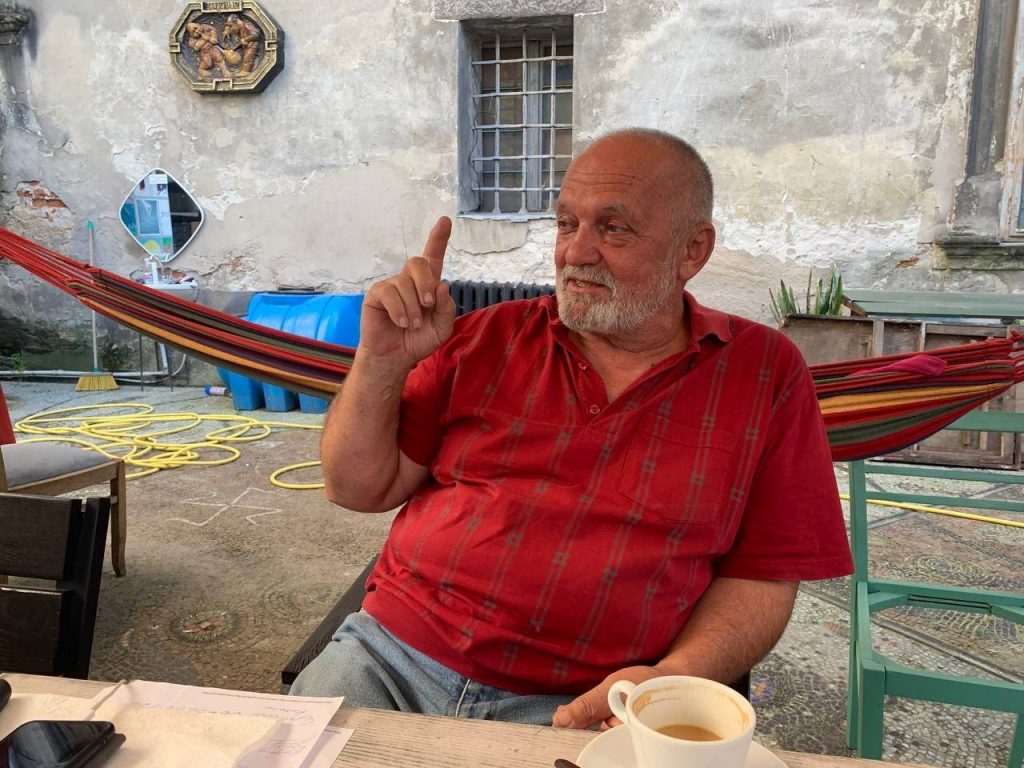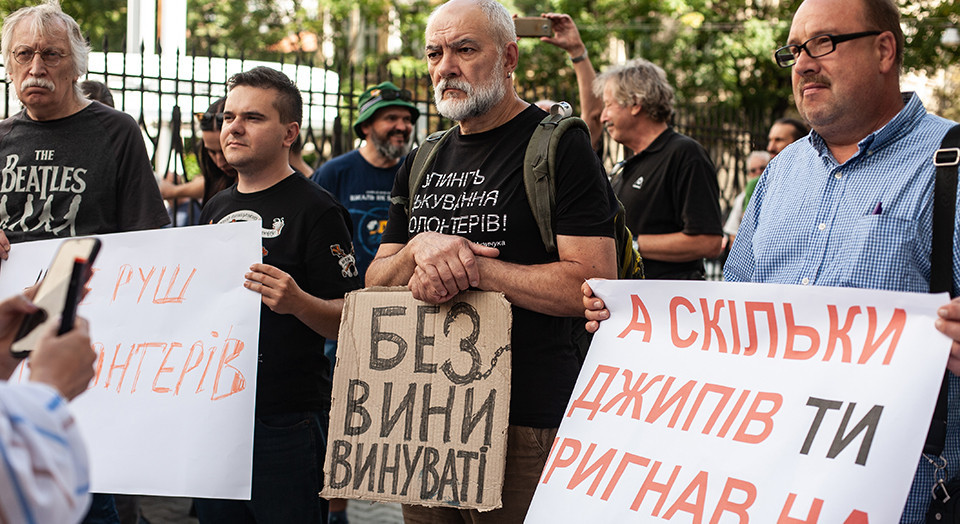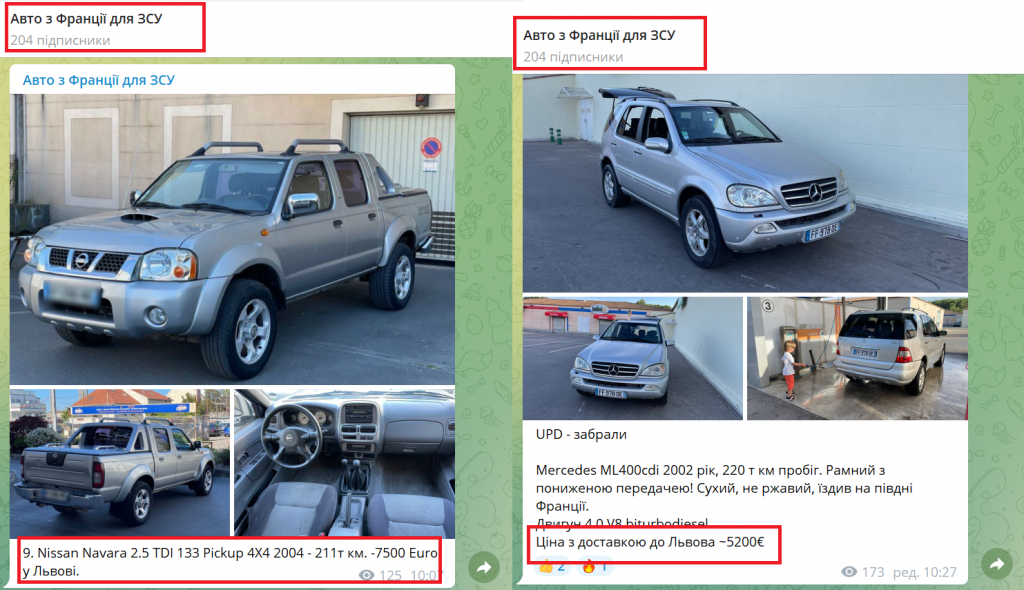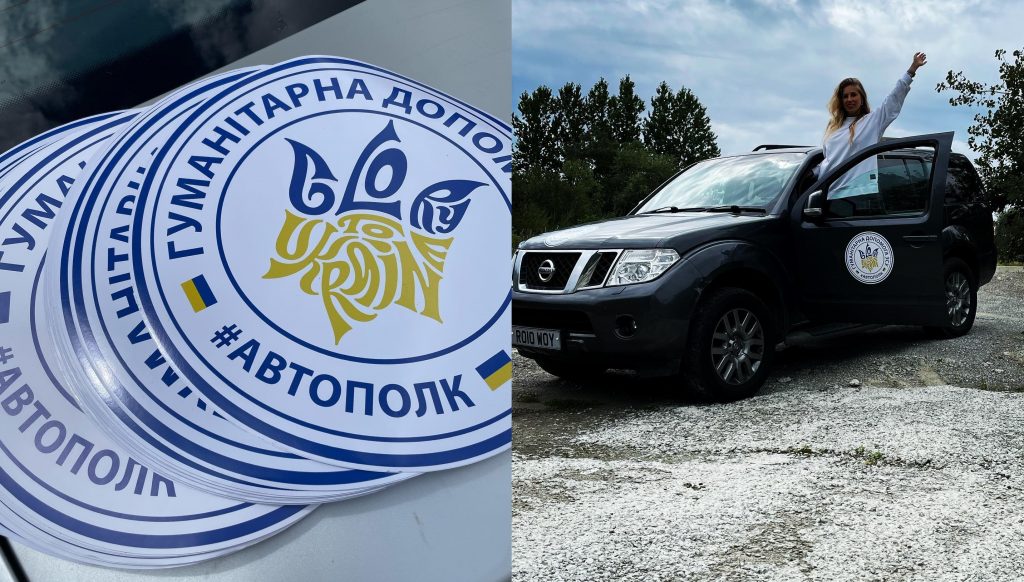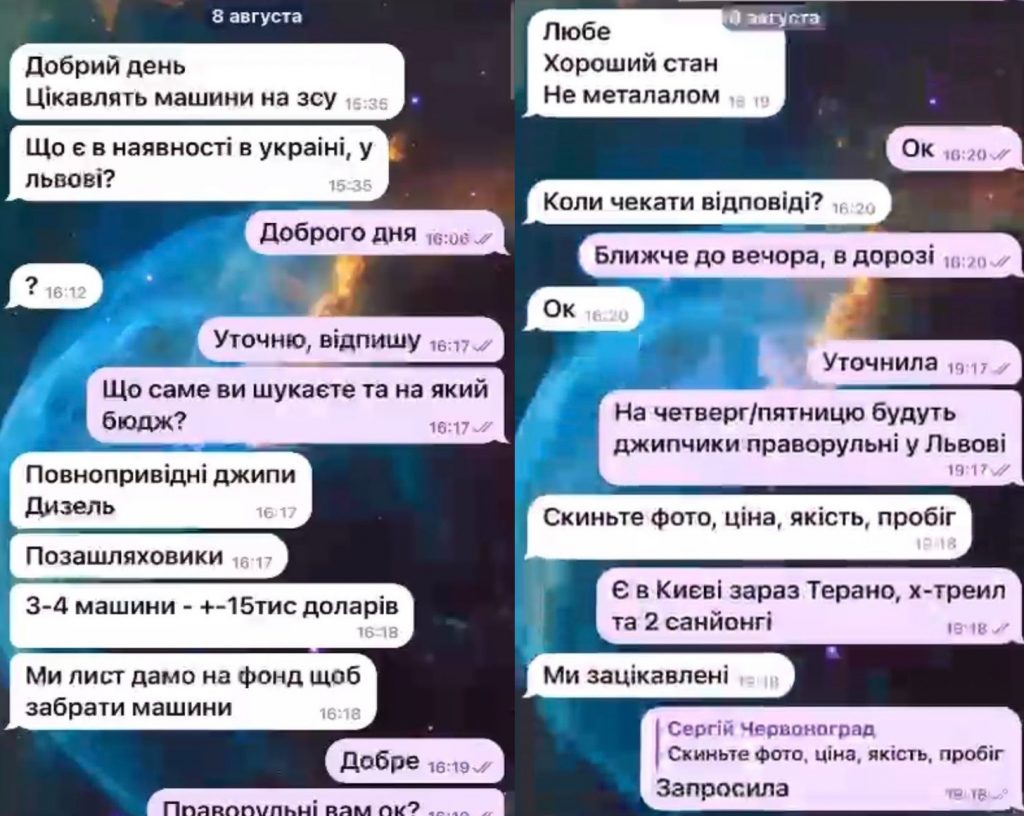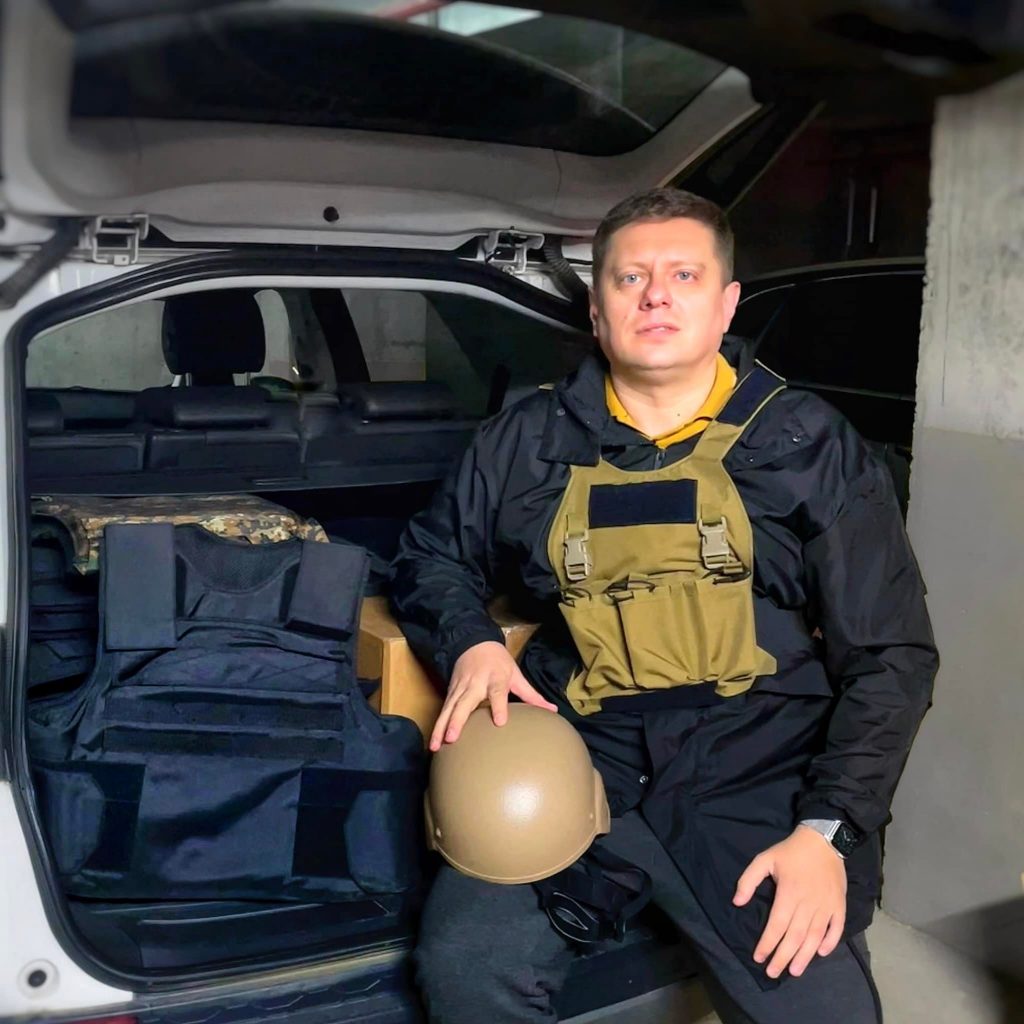Several weeks ago, our editorial team started investigating cases on volunteers’ work. We were looking for the answers to questions whether cases against volunteers were really fabricated and who is being used for that purpose.
We gathered lots of information and hoped to continue working at the material for some more time. However, yesterday morning police paid a search visit to a well-known volunteer and activist Sviatoslav Litynskyi, who together with his supporters helped to bring more than 250 vehicles for military into Ukraine. At the same time, searches happened at Nazar Ostrovskyi’s, his colleague in volunteer work.
That’s why we decided to publish our investigation with the facts known to us as of today. And they are disappointing indeed – there are facts of involving shady persons in law enforcement’s operations.
***
“He kept insisting – the money has been raised, women were raising it for their sons! My people are dying in Donetsk! So, I agreed to give him those vehicles”, this is the quote from a conversation with a famous Lviv artist, architect and volunteer Oles Dzyndra, who suddenly turned into a suspect.
“I cancelled passing him the vehicles despite the fact we even had acts drawn up”, says Mykola Nasinskyi, head of two charity foundations. In total, his group gave the military 400 vehicles, he said. According to our sources, Nasinskyi was supposed to became a subject of investigation, if he had passed the vehicles.
They both are talking about the same man – Serhii Sharko, officer of Chervonohrad military recruitment office responsible for purchasing equipment. His job description includes finding and engaging vehicles for the UAF.
It was him who made agreements with volunteers about vehicles and it was after cooperation with him that volunteers’ names started appearing in the texts of criminal proceedings.
We also found that people with an experience of cooperating with security forces enforcement were involved into at least one case related to volunteers. Most likely, there are more cases like these. And more people who are cooperating with law enforcement to “expose” volunteers.
According to the latest information from Lviv regional prosecutor’s office, investigators of the National Police opened 35 criminal proceedings related to humanitarian aid and volunteer activity in Lviv regional, and the State Bureau of Investigations is conducting three more proceedings (data as of August 30). It sounds respectable, but there is a court ruling in one case only; however, it’s not about grand machinations, but about theft of seven tablets from the volunteer organization’s warehouse.
Our sources inform that activation of cases against volunteers already resulted in the majority of those who were bringing in vehicles for the UAF either put their activities on hold or are working with reliable contacts only.
“That’s when I understood I was a fool”
We are talking with Oles Dzyndra in the yard of “Trapezna Idei” in Valova street. It is a well-known Lviv private gallery and restaurant where only several weeks ago the queuing IDPs could receive warm food. “Trapezna” was feeding people since early March and stopped just after the search despite the fact it had no plans to stop this initiative.
We met to talk about charges against Dzyndra involving illegal sale of humanitarian aid, particularly vehicles for the UAF. Back then we didn’t know that the measure of restraint would be chosen for him very soon, and that a huge support team will come to the court, and that Dzyndra would be released for the period of investigation under his personal commitment. His active volunteer work on providing the military with vehicles is over, and so is feeding the IDPs.
The search of the volunteer’s office happened on August 4, when Serhii Sharko, an officer from Chervonohrad recruitment office came to him to bring money for four vehicles the keys from which he had collected earlier. Dzyndra recollects how he was explaining that the sum decreased because additional repair was required, but Sharko quickly gave him the money and left the office. It was then that Oles and his colleagues noticed the money was fake.
“I told him the sum we discussed was smaller now. And he was like: “It’s fine, it’s fine! Let it be!” That’s when I understood I was a fool. We were laughing at first and taking photos with a “dummy” that was planted on us. Until 15 people came to search the office”, recollects Oles Dzyndra.
Oles Dzyndra and Yurii Muzychuk (the second suspect on this case) were served the official notice of charges only on August 29. Court session to choose preventive measure took place on August 30. Press release of the Directorate of the Security Service of Ukraine in Lviv region describes it as a “large-scale scheme for stealing humanitarian aid”. It was only because volunteers brought into the country more than 30 vehicles for UAF needs.
“Four vehicles were brought into Ukraine as a charitable aid for military through an NGO. In reality they were sold for 20,700 euro. An officer from military recruitment office saw an advertisement on Telegram channel about vehicles for UAF, and wanted to receive them for free for the recruitment office where he works. But when he applied, he learned that he needs to pay for them. That’s why he contacted law enforcement”, says Vasyl Danilei, deputy head of Lviv department for regional prosecutor’s office.
If you just hear this point without checking it, it sounds like the volunteers indeed decided to make a buck on the military. What do we have? Only the last four vehicles given to Chervonohrad military recruitment office and, according to Danilei, “were brought into the country as a humanitarian aid”, are connected to Muzychuk and Dzyndra’s case. If this is the case, someone was supposed to give these vehicles to volunteers first. Who are these people? They don’t exist. Volunteers say they purchased the vehicles with their own funds. And in no way did they lead the recruitment officer to believe that he can take the vehicles for free.
“Yes, I’m buying cars with my own money and I’m bringing them in. And yes, I’m taking charitable donations to go and bring in more vehicles. That’s what I do. Am I breaking the law? I don’t know! Everyone is working like that! But it’s only on us that they planted a “dummy” with money”, Oles Dzyndra is saying with strong emotion.
Telegram channel “Vehicles from France for UAF” that the prosecution refers to, created by Andriy, Oles Dzyndra’s son on May 1, clearly lists the vehicles prices. The idea of the channel is finding a vehicle to suit the military’s needs and bring it to Ukraine. The fleet is consistent with the purpose, off-roaders made in early 2000s. Each photo is accompanied by a price in euros – the sum at which the vehicle was purchased from its French owners or its final price including repair and transportation to Lviv.
According to Oles Dzyndra, it’s through this Telegram-channel that Serhii Sharko contacted Oles’ son asking to find vehicles. Andrii Dzyndra is in France now under official volunteer permit signed by Valerii Zaluzhnyi with the aim of finding vehicles which are virtually expendables for the military these days. Andrii said he had no vehicles, but he can ask his father.
“My friends and I were supposed to go to Slovenia to bring in four vehicles. We found a comrade there who is helping us pick up cars”, explained Dzyndra-senior.
These were the vehicles Dzyndra offered to Sharko.
“The procedure is known – we bring the car into the country for a foundation that takes care of the border crossing and receives the car from us as a gift. We are buying vehicles with our own money and give them to the final recipient, military unit, through a foundation”, Dzyndra is hiding nothing.
Many volunteers work like that. A typical scheme is this: vehicles are purchased from private sellers with the own (or raised) money. The vehicle is registered at the border as humanitarian aid, with the recipient being an NGO or a charity foundation, which then gives the vehicle to the military unit without payment. Why couldn’t they register the cars with the customs as a humanitarian aid for a certain military unit? They could, and many volunteers do exactly this – they indicate the military unit as a recipient in the documents. But it’s not always possible to receive a letter from the military fast enough. That’s why an NGO or a foundation is used as a recipient.
We asked Serhii Sharko if he indeed was unaware that the foreign owners of these cars aren’t giving them for free and if he didn’t see the prices under photos. The man responded with a counter-question:
“Are you aware there’s the secrecy of investigation and I’m not authorized to give comments? You’ll learn about everything in its own good time, when all the details of the case are revealed”.
We managed to receive even less information at Chervonohrad military recruitment office. We received the following answer to our question about location of the four vehicles: “It’s martial law period! We give no comments”.
We understood that the official details of the case will take a long time to reveal, so we started figuring them out on our own. That’s when we found that Oles Dzyndra wasn’t the only one who came into agreement with Serhii Sharko.
“We suspected it was a person from the Security Service of Ukraine”
Head of two charity foundations “Support Ukraine” and “Support of Ukrainian battalions” Mykola Nasinskyi and his volunteer friends could have faced the same fate, but the man started getting suspicious just in time.
Serhii Sharko also tried to purchase cars for the UAF from them in August. It looked like he also found information about the vehicles through a Telegram-channel.
“Right, an employee of Chervonohrad military recruitment office contacted us on the matter of supposedly purchasing vehicles. We had cars in Lviv and were just planning to transfer them to the UAF under the act”, says Nasinskyi now.
However, volunteers started getting suspicious. The matter was that most often these are not military units or recruitment offices contacting them directly, but families and friends of the soldiers who want to find a vehicle precisely for their relative and his unit. Besides, the size of request was strange too: it wasn’t about one car, but three or four, and later even more, seven.
“I aborted the deal. We suspected it was a person from the Security Service of Ukraine or another agency. Who is this man working for? It’s a traitor!”, says Mykola Nasinskyi.
Sharko’s activity also raises some questions for us. These days he’s officially employed by Chervonohrad military recruitment office, but he also remains a co-owner of Matrix advertising agency and Consult-Partner agency. A year before Sharko was a deputy director of Sosnivka city hospital where he was responsible for procurement. And before that he was a lawyer.
Despite the fact that Nasinskyi stopped the deal with Sharko, the same sources are informing us that criminal proceedings have been opened under the same article, sale of humanitarian aid. And Nasinskyi’s name is involved.
“All sellers are keeping aloof”
Mykola Nasinskyi has never contacted Sharko personally. It was done by Natalia Rodinova, a volunteer who is coordinating the “Avtopolk” [“Automobile regiment” (Ukr.)] group. Nasinskyi’s foundation joined this initiative. The group tallies roughly four hundred “car volunteers” – people who are helping to find and bring in vehicles for the military.
The scheme usually works like this: after soldier’s family or friends raise funds for a car, they’re trying to find someone able to quickly bring it in from abroad where they are much cheaper. That’s when “Avtopolk” becomes useful, its task being the delivery of the car to Ukraine. They don’t take payment for their efforts – only the price of the car itself and the consumed fuel.
“Nobody gives us these vehicles for free”, – says Natalia Rodinova. “People fundraise on their own, we are looking for a car in foreign countries, then we bring it in and repair it. It may cost as much as $1,500 to repair an engine”.
Natalia Rodinova showed us messages from Serhii Sharko, employee of the military recruitment office. He wrote her on August 8 for the first time, asking to purchase a vehicle, not receive it for free.
His messages did look like it was a typical request from the military.
“Any car. Good condition. Not scrap metal”, he wrote, indicating that his budget for 3-4 cars was more or less $15,000.
Sharko was very thorough about the documents during the conversation. He asked to send draft vehicle acceptance certificates for approval, indicate transferor’s full name and dates.
On August 21 he asked when would she send documents. But because of Nasinskyi’s suspicions, volunteer Natalia responded that the cars were no longer available:
“All sellers are keeping aloof(((… I think you understand why”.
Serhii Sharko never replied.
The manhunt for volunteers conducted by security officials is likely related to the fact that numerous vehicles for UAF are crossing the border, but not all of them are officially registered as military property. Natalia Rodinova explains that it’s a usual thing for the military not to have official seals with them at the moment when they take vehicles, so it is quite a long time that volunteers have to wait to receive the documents.
He used to be a hooligan and became a respectable citizen
Roman Matys and Yevhen Shpytko’s arrest became one of the most high-profile cases of volunteers’ detention. They were arrested in May this year. The first one is a former head of investment policy department with Lviv Regional State Administration. The second is the editor of Mind.ua website.
The investigation claims that the accused managed to sell body armor and helmets brought is as a humanitarian aid for the military, to the amount exceeding half a million hryvnias.
The procurement was officially done by Artan Center company through a subsidiary of UkrSpetsExport state company. The contract read that the equipment is purchase for the purpose of transferring it to the Ukrainian Armed Forces and/or military administrations etc. After body armor, armored plates and helmets were received, they were presumably sold.
However, the lawyers stated in the court that as of that moment there was no evidence that these vests and helmets were brought is as humanitarian aid and as a part of the said contract. Moreover, investigators provided no evidence of any PPE purchased under the contract not being given to the military.
Vasyl Danilei, deputy head of Lviv department for regional prosecutor’s office, is sceptical about the defense arguments. It’s not surprising, that’s the lawyers’ job. He literally “has no doubt” that the PPE on sale was exactly the equipment previously purchased as humanitarian aid. And they have no confirmation that other agreements exist.
“Several dozen people donated their money to the company, but in reality, there was no control over how these funds were being disposed of”. Presumably something was given to military units, some documents were drawn, but we contacted military units and still received no confirmation,” he says.
Meanwhile, as the ruling reads, what witnesses on the case had bought was the “humanitarian aid”. In this case these were two people who on several occasions, between late April and early March bought body armor and helmets from the suspects, Matys and Shpytko.
23-year-old Rostyslav Heleta from Lviv is one of them. He registered as a private entrepreneur only in February this year, and as early as in March he received his first one-million order – he sold coal through Prozorro public procurement portal to Yavoriv apartment maintenance unit.
In his student years, four years before, he was charged with beating another person which resulted in “medium severity bodily injury”. However, criminal proceedings were closed, because the victim dropped the charges. Later, in 2021 he used foul language while talking to police and was fined 119 hryvnias.
Nothing of the above prevents Heleta from being an exemplary citizen. For it turned out that the case with body armor is not the only one in which he “exposed criminals”. Several weeks prior to the operation of purchasing PPE, he also bribed the acting chief accountant of Health-improving complex “Rovesnyk” for LvivVugillia state enterprise in Chervonohrad. On April 18 Heleta negotiated with the accountant about his off-the-books stay in the complex for 30,000 UAH. The accountant was removed from office and the investigation is ongoing.
After hearing our first question, Heleta asked to call him again in the afternoon and never responded again, even when we were calling from different phone numbers.
“We are patriots and we don’t think about the profit”.
A man named Andrii (he asked us not to reveal his surname) who has been in business of repairing and selling cars for more than 10 years now is another suspect on the case of selling “humanitarian” vehicles.
He recollects that his former clients placed an order to bring a first car for a soldier, but he was killed before the vehicle was found, brought in and repaired:
“That’s when I understood that the time was of highest importance. A vehicle should be ready to be transferred, and as soon as we have a request, the military need to receive it within 2-3days”.
He believes his detention is related to the conflict with a charity foundation he used to cooperate with. Later he started working with a new foundation that was giving him letters to bring cars in as humanitarian aid. Then Andrii was repairing cars and selling them to those who wanted to give it the the UAF. It was during such sale that he was detained on June 30.
“I made no profit from the vehicles. “We are patriots here in Lviv region and we don’t think about the profit. I donated one car and I sold three and that’s how I wanted to break even. I could bring in the vehicles connected to the case at 0% custom duty. It was still a possibility back then”, says Andrii.
Taras Mazuryk was the one buying the car as a part of the “operation”. A man with such a name is an ATO veteran. He also was a candidate for a local policeman position in Frankivskyi police precinct in Lviv. GetContact identifies his phone number as “Berkut kid Taras”, “Taras Frankivskyi”, “Taras Bnon Vereshchytsia” and so on. According to YouControl, Taras Mazuryk submitted an income declaration on 2019, following his leaving a position of a detective in Frankivskyi police precinct. Now the precinct informed us they didn’t employ this person.
He responded to our first phone call and asked to call again the following day. However, he kept ignoring any further calls from us.
***
There is a concept of a “torpedo” on bribery cases. These are people who are professional bribe-givers. They regularly cooperate with law enforcement to instigate violation of the law. These “torpedos” were exposed in Lviv region on numerous occasions; they played a role of “victims” on the cases against officials. Several years ago, ZAXID.NET described activity of an “agent” Yaroslav Sukhostavskyi who was connected at least to five similar cases. Sometime before, a doctor Natalia Van Doeveren accused of taking a bribe, exposed the entire network of such “torpedoes” during a press-conference.
We can’t prove or disprove the guilt of any persons mentioned in this material. However, we can doubt the fairness of law enforcement agencies’ methods, as well as biographies of those people who participated in these operations.
Authors of this article are participants of Interlink Academy Fellowship program funded by the German government.

